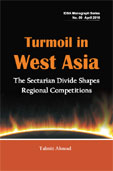Turmoil in West Asia: The Sectarian Divide Shapes Regional Competitions
- 2016 |
- Monograph
 Five years after the Arab Spring, West Asia is witnessing two major military conflicts in Syria and Yemen. Several states are deeply polarised and at the edge of breakdown, and there is proliferation of jihadis across the region, engaged in extraordinary brutality against enemy states and “heretic” communities. The violence, the fear of jihadi contagion, and the possible breakdown of state order across West Asia have pulled in international powers into the region’s conflicts. Though the ongoing conflicts and competitions are the result of recent developments in the West Asian state systems, the battle-lines have been deliberately shaped on the basis of primeval sectarian cleavages and animosities that have been resurrected and imbued with a contemporary resonance to serve modern-day political interests. This monograph analyses, in a historical perspective, the political and strategic factors that have led to the Saudi-Iran confrontation and how doctrinal differences are being used to shape their competition for regional power and influence. It also looks at the sectarian factor driving the violence of the Islamic State. Finally, it discusses the influence of sectarianism in coming years on the evolving political order in West Asia.
Five years after the Arab Spring, West Asia is witnessing two major military conflicts in Syria and Yemen. Several states are deeply polarised and at the edge of breakdown, and there is proliferation of jihadis across the region, engaged in extraordinary brutality against enemy states and “heretic” communities. The violence, the fear of jihadi contagion, and the possible breakdown of state order across West Asia have pulled in international powers into the region’s conflicts. Though the ongoing conflicts and competitions are the result of recent developments in the West Asian state systems, the battle-lines have been deliberately shaped on the basis of primeval sectarian cleavages and animosities that have been resurrected and imbued with a contemporary resonance to serve modern-day political interests. This monograph analyses, in a historical perspective, the political and strategic factors that have led to the Saudi-Iran confrontation and how doctrinal differences are being used to shape their competition for regional power and influence. It also looks at the sectarian factor driving the violence of the Islamic State. Finally, it discusses the influence of sectarianism in coming years on the evolving political order in West Asia.
About the Author
Talmiz Ahmad joined the Indian Foreign Service in 1974. He worked in Kuwait and Baghdad; was Charge d’Affaires in Sanaa, Yemen, in 1979-81; and then Consul General in Jeddah (1987-90). He headed the Gulf/Hajj Division in the Ministry of External Affairs in 1998-2000. He was Ambassador to Saudi Arabia twice (2000-03 and 2010-11), to Oman (2003-04), and the UAE (2007-10). He was also Additional Secretary responsible for international cooperation in the Ministry of Petroleum and Natural Gas, and Director General of the Indian Council of World Affairs (2004-07). He is now an independent consultant based in Dubai. He has authored three books on West Asia—Reform in the Arab World: Eternal Influences and Regional Debates [2005]; Children of Abraham at War: The Clash of Messianic Militarisms [2010], and Islamist Challenge in West Asia: Doctrinal and Political Competitions after the Arab Spring [2013].




